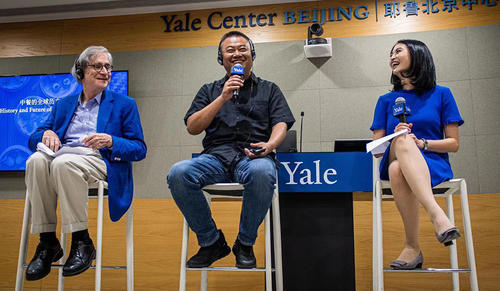
From left: Yale professor Paul Freedman; director Xiaoqing Chen; and Carol Li Rafferty, executive director of Yale Center Beijing.
https://news.yale.edu/2019/08/28/food-experts-share-views-culture-and-cu…
More than 150 alumni and friends gathered at the Yale Center Beijing on Aug. 16 for a conversation on food and culture featuring Paul Freedman, the Chester D. Tripp Professor of History at Yale University, and Xiaoqing Chen, the celebrated director of “A Bite of China,” a documentary series on the history of Chinese food.
Freedman and Chen exchanged views on the culture and history of food in China and the West. Freedman began by talking about his admiration for the rich culinary traditions of China and how those traditions are being preserved. He went on to explain how American food has been influenced by a confluence of cultures, standardization, and technology.
Chen opened his remarks with examples of integration and cross-pollination of food traditions across the globe, citing ketchup as a condiment that traced its origins from the seashores of Southern China and traveled through Europe to arrive in the United States. Chen emphasized that “through food, we can see the range of human emotion and wisdom; we can see the development of human history and culture.”
In today’s ever-changing world, food is a bridge for humanity, bringing together cultures and countries.
Xiaoqing Chen
“In today’s ever-changing world,” Chen continued, “food is a bridge for humanity, bringing together cultures and countries.”
Carol Li Rafferty ’00, executive director of the Yale Center Beijing, moderated their conversation, which was part of the Greenberg Distinguished Colloquium series. The colloquium is made possible by the generosity of Maurice R. Greenberg, chair and CEO of C.V. Starr & Co. Inc. and a recipient of the China Reform Friendship Medal in 2018.
Although this was his first visit to China, Freedman has written about how Chinese cuisine was adapted to American tastes in his book “Ten Restaurants that Changed America” (2016). He was in Beijing for a seminar organized by the Yale Center Beijing on “The History of the Middle Ages and Global Food Trade.” Over 60 participants, ranging from high school students to business executives, took part in the weekend seminar, which looked at history through the lens of food and cuisine.
Before his talk in Beijing, Freedman also visited Sichuan and Zhejiang, where he experienced local foods and cuisines. When asked about his favorite dishes from the trip, Freedman named jujubes (or Chinese dates) soaked in wine and eels “with their backbones taken out, fried, and eaten as a snack.”
“I know that is going to be a hard sell in the United States,” he said as the audience chuckled, “but I loved it.”
Freedman and Chen agreed that the globalization of food is nothing new. Freedman recounted how Europeans’ craving for luxury foods — namely spices and sugar — shaped world history, and Chen explained how the adaptation of new crops such as corn and potato contributed to a dramatic rise in China’s population from the 17th to the 19th centuries.
Today, both Freedman and Chen are working to influence the public’s perception of food. Chen directed a number of documentary series on Chinese food that have received worldwide acclaim, and he said he drew inspiration from Freedman’s work on the history of food. Freedman said he believes that Americans have yet to learn enough from Chinese cuisine, especially in using techniques such as fermentation, and that the variety of Chinese regional cuisines in the United States has yet to be fully explored.
During the Q&A session, audience members asked about a wide variety of topics — from health, to plant-based meats, to nostalgia. Freedman pointed out that people often miss the most basic foods from their home, such as bread, pasta, and dumplings. Chen noted that eating habits have a deeper significance than mere necessity or a craving for fine dining — that our longing for home cooking is firmly rooted in our memory and experiences.
“Three times a day, as we are eating, we are reminded of where we came from and where we are headed,” Chen remarked.
The two speakers also addressed the impact of technology on food culture. Chen said he sees social media as a natural development that stemmed from the impulse to share food, while Freedman said he views the sharing of food images on social media as part of a competition. Chen argued that while technology has brought about convenience and made many more kinds of food available, many tastes are being eroded and lost. Freedman contended that people still maintain close contact with their food, so despite the emergence of new technologies, food culture will always continue to exist and evolve.
The colloquium previously featured talks by Yuri Kordonsky, professor at the Yale School of Drama; Unni Karunakara ’95 M.P.H., former international president of Doctors Without Borders and assistant clinical professor at the Yale School of Public Health; Stephen Roach, senior fellow at the Jackson Institute of Global Affairs and senior lecturer at the Yale School of Management; Odd Arne Westad, professor of history at Yale; Ma Yansong ’02 M.Arch., founder & principal partner, MAD Architects; and Derek Chang ’89, CEO of NBA China.
The Yale Center Beijing, Yale’s first university-wide center outside of the United States, is a convening space and intellectual hub that advances Yale’s mission to improve our world and develop leaders worldwide who serve all sectors of society. Founded in 2014, the center acts as an activity space for Yale’s collaborations in China, enables the university to expand existing activities and form new partnerships, supports research and study from each of the university’s schools and divisions, and serves as a gathering place for alumni from throughout Asia.